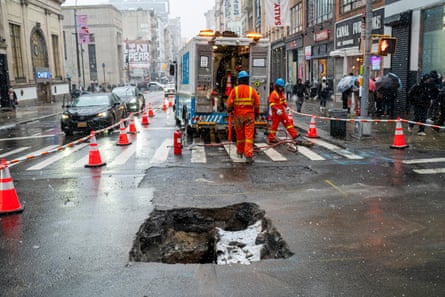Con Edison, city’s monopoly utility, cut off 88,000 households in first half of 2025 as climate crisis drives extreme temperatures
A man transports an air conditioner on a bicycle during a heat wave in New York on 24 June 2025. Photograph: Selcuk Acar/Anadolu via Getty Images
An energy company seeking to hike utility bills in New York City by 11% disconnected more than 88,000 households during the first six months of 2025, signaling a crackdown on families struggling to cover rising energy costs even as the climate crisis drives extreme temperatures.
Con Edison, the monopoly utility that provides electricity to 3.6m homes across the country’s largest city and neighboring Westchester county, disconnected almost 2.5% of all its customers between January and June this year – triple the total number of families left without power in 2024. One in five disconnected homes remain without power for at least a week.
The utility shut off 16,327 households in the month leading up to 25 June. New York was hit by its first heatwave between 23 and 25 June, breaking daytime and night-time records in Central Park and driving a surge in emergency room visits.

New York is among the most expensive places for electricity, with families shouldering above-inflation price hikes in recent years on top of unaffordable housing and the broader cost of living crisis stemming from the Covid pandemic.
Heat-related deaths account for about 3% of all fatalities from May through September, making New York the second deadliest city for heat after Phoenix, Arizona.
In the past five years, more than 40% of New Yorkers have fallen into arrears, and 23% of households were disconnected at least once – leaving families without access to a fridge, internet, cooking facilities and heat or cooling until they can find the money to pay for reconnection.
Black and Latino New Yorkers are more than twice as likely as white residents to fall behind, and almost eight times more likely to have a utility shutoff, according to the 2024 Poverty Tracker/Robin Hood report on energy insecurity.
“Disconnection is an effective cost recovery strategy but it’s also completely inhumane. It’s traumatizing for families and costs some people their lives,” said Diana Hernandez, co-author of the report and associate professor of sociomedical sciences at Columbia University.
“People want to pay their bills but they are unaffordable for too many families.”

Almost 16% of New York homes – one in six Con Edison residential customers – were behind on their energy bills at the end of 2024, with debts totaling $948m, according to data submitted by the utility to the state regulator.





0 Comments